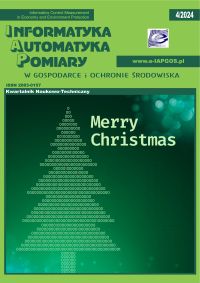SYNTEZA ALGORYTMÓW BEZPIECZNEGO POSTĘPOWANIA W SYSTEMACH RADIOELEKTRONICZNYCH DO ZASTOSOWAŃ W SYTUACJACH KRYTYCZNYCH
Leonid Ozirkovskyy
l.ozirkovsky@gmail.comLviv Polytechnic National University, Department of Theoretical Radio Engineering and Radio Measurement (Ukraina)
http://orcid.org/0000-0003-0012-2908
Bohdan Volochiy
Lviv Polytechnic National University, Department of Theoretical Radio Engineering and Radio Measurement (Ukraina)
https://orcid.org/0000-0001-5230-9921
Mykhailo Zmysnyi
Lviv Polytechnic National University, Department of Theoretical Radio Engineering and Radio Measurement (Ukraina)
https://orcid.org/0000-0002-3384-6139
Oleksandr Shkiliuk
Lviv Polytechnic National University, Department of Theoretical Radio Engineering and Radio Measurement (Ukraina)
https://orcid.org/0000-0001-9237-4808
Abstrakt
Bezpieczeństwo radiowych systemów elektronicznych używanych w sytuacjach krytycznych jest tradycyjnie zapewnione przez wprowadzenie redundancji strukturalnej. W pracy zaproponowano sposób zapewnienia określonego poziomu bezpieczeństwa radiowych systemów elektronicznych poprzez wprowadzenie redundancji czasowej i funkcjonalnej do algorytmu postępowania. Aby zmierzyć wydajność wprowadzonej redundancji, zaproponowano określone cechy bezpieczeństwa. Artykuł przedstawia metodę syntezy algorytmów bezpiecznego postępowania na podstawie minimalizacji wzrostu wartości określonych cech bezpieczeństwa. Opracowana metoda została przetestowana podczas rozwiązywania problemu syntezy algorytmu postępowania dla złożonego systemu radioelektronicznego przeznaczonego do wykrywania celów.
Słowa kluczowe:
bezpieczeństwo, inżynieria bezpieczeństwa, algorytm postępowania, projekt systemuBibliografia
Alexander R., Alexander-Bown R., Kelly T.: Engineering Safety-Critical Complex Systems. Proceedings CoSMoS 2008: Workshop on Complex Systems Modelling and Simulation. Luniver Press, 2008, 33–62.
Google Scholar
Ayoob M.; Adi W.: Fault Detection and Correction in Processing AES Encryption Algorithm. Proceedings Sixth International Conference on Emerging Security Technologies (EST), Braunschweig, Germany, 2015, 7–12.
DOI: https://doi.org/10.1109/EST.2015.13
Google Scholar
Benoit A., Robert Y., Vivien F.: A Guide to Algorithm Design. Paradigms, Methods, and Complexity Analysis. CRC Press Published, 2013.
DOI: https://doi.org/10.1201/9780429428890
Google Scholar
Bobalo Yu., Volochіy B., Lozinsky O., Mandziy B., Ozirkovsky L., Fedasyuk D., Scherbovskikh S., Yakovina V.: Mathematical Models and Methods for Reliability Analysis of Radio. Electronic and Software Systems. Lviv Polytechnic National University, 2013. (in Ukrainian).
Google Scholar
Dubrova E.: Fault-Tolerant Design. Springer, New York 2013.
DOI: https://doi.org/10.1007/978-1-4614-2113-9
Google Scholar
Hobbs C.: Embedded Software Development for Safety-Critical Systems. Second edition. Routledge, 2019.
DOI: https://doi.org/10.1201/9780429323010
Google Scholar
Kleinberg, J., Tardos E.: Algorithm design. First edition, Pearson, 2005.
Google Scholar
Pietrantuono R., Russo S.: Introduction to Safety Critical Systems. Innovative Technologies for Dependable OTS-Based Critical Systems. Challenges and Achievements of the CRITICAL STEP Project, Springer, 2013.
DOI: https://doi.org/10.1007/978-88-470-2772-5_2
Google Scholar
Rausand M.: Reliability of Safety-Critical Systems: Theory and Applications. Wiley-Blackwell, 2014.
DOI: https://doi.org/10.1002/9781118776353
Google Scholar
Saha S., Sadi M. S.: Synthesizing fault tolerant safety critical systems. Journal of Computers 9(8)/2014, 1809–1816.
DOI: https://doi.org/10.4304/jcp.9.8.1809-01816
Google Scholar
Shafei E., Moawad I., Sallam H., Mostafa A.: A Methodology for Safety Critical Software Systems Planning. Proceedings 7th WSEAS European Computing Conference (ECC '13), Dubrovnik, Croatia, 2013.
Google Scholar
Skiena S.: The Algorithm Design Manual. 2 ed., Springer, 2009.
DOI: https://doi.org/10.1007/978-1-84800-070-4
Google Scholar
Trukhanov V. M.: Reliability of Technical Systems of Mobile Units Types at the Stage of Prototypes Design and Testing. Mashynostroenie, 2003. (In Russian).
Google Scholar
Van Beek T., Tomiyama T.: Requirements for Complex Systems Modeling. Proceedings 18th CIRP Design Conference - Design Synthesis. Enschede, Netherlands, 2008.
Google Scholar
Viktorov D.: Algorithm Providing Fault Tolerance of Onboard Computing Systems with Structural and Time Redundancy. Information and Control Systems 6(2011), 30–35. (in Russian).
Google Scholar
Volochiy B., Ozirkovskyi L., Shkiliuk O. Mashchak A.: Technique of Construction Models of Behavior Algorithms of Radio Electronic Complex System using the Scheme of Paths Method. International Journal of Computing 13(3)/2014, 183–190.
Google Scholar
Volochiy B., Mandziy B., Ozirkovskyi L.: Extending the features of software for reliability analysis of fault-tolerant systems. Computational Problems of Electrical Engineering 2(2)/2012, 113–121.
Google Scholar
Autorzy
Leonid Ozirkovskyyl.ozirkovsky@gmail.com
Lviv Polytechnic National University, Department of Theoretical Radio Engineering and Radio Measurement Ukraina
http://orcid.org/0000-0003-0012-2908
Autorzy
Bohdan VolochiyLviv Polytechnic National University, Department of Theoretical Radio Engineering and Radio Measurement Ukraina
https://orcid.org/0000-0001-5230-9921
Autorzy
Mykhailo ZmysnyiLviv Polytechnic National University, Department of Theoretical Radio Engineering and Radio Measurement Ukraina
https://orcid.org/0000-0002-3384-6139
Autorzy
Oleksandr ShkiliukLviv Polytechnic National University, Department of Theoretical Radio Engineering and Radio Measurement Ukraina
https://orcid.org/0000-0001-9237-4808
Statystyki
Abstract views: 304PDF downloads: 9054
Licencja

Utwór dostępny jest na licencji Creative Commons Uznanie autorstwa – Na tych samych warunkach 4.0 Miedzynarodowe.
Inne teksty tego samego autora
- Bohdan Volochiy, Mykhailo Zmysnyi, Leonid Ozirkovskyy, Volodymyr Onyshchenko, Yuriy Salnyk, POPRAWA JAKOŚCI KLASYFIKACJI OBIEKTÓW RUCHOMYCH W SYSTEMACH ALARMOWYCH Z WYKORZYSTANIEM CZUJNIKÓW SEJSMICZNYCH , Informatyka, Automatyka, Pomiary w Gospodarce i Ochronie Środowiska: Tom 8 Nr 4 (2018)








